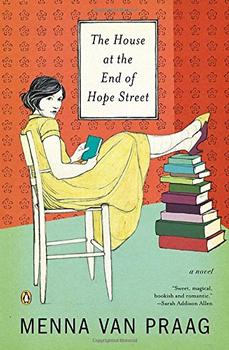Summary | Excerpt | Reading Guide | Reviews | Beyond the Book | Readalikes | Genres & Themes | Author Bio

Alba nods, still captivated by the kitchen's smells, still shocked by the turn her night has taken, not really registering what Peggy's saying. While the old woman pours a pint of milk into the saucepan, Alba glances around the kitchen. It's vast, the length of a long garden, with creamy yellow walls that reach up to meet black oak beams running across the arched ceiling. As in the hall, every inch of the kitchen is covered with endless rows of photographs. Alba gazes at them, wondering who they are and why they are decorating the old woman's walls.
"They've all lived here, at one time or another." Still stirring the milk at the stove, Peggy speaks without turning around. "They came to the house, just like you, when they'd run out of hope."
Alba frowns at the back of Peggy's patchwork dressing gown, at the wild white hair reaching down to her waist, wondering how on earth the old woman knew what she was thinking.
"They left to lead wonderful lives or, in some cases, afterlives." Peggy chuckles. "The old residents can inspire you, if you let them. One in particular, actually."
"Oh?" Alba asks, only half listening. In a frame just above the kitchen sink she sees an oil painting of a woman with blond hair twisted into knots at the sides of her head. Alba squints for a better look. "But, that's--
"Yes." Peggy doesn't turn to look. "She stayed here in 1859, suffering from a severe bout of writer's block. She started writing Middlemarch in this very kitchen."
"No," Alba gasps, "really?"
"Oh yes. Half the history of England would be quite different if this house had never been built, believe me."
And although she can't explain why, Alba does. She already feels closer to this old woman than to her own family. Peggy stops stirring, steps over to the fridge, tugs open the door, sticks her head inside and takes out a china bowl. "This cream is the real stuff," she says, and smiles. "I whipped it up myself. I can't countenance that synthetic crap one squirts from a bottle, can you?"
"No." Alba agrees, amused to hear such a sweet old lady swear. "I'm glad to hear it." Peggy sets the bowl down on the marble counter next to the stove. "I can't trust anyone who won't take real cream, or real sugar. Those--Peggy searches for the word and shudders--sweeteners. They really are beyond the pale, don't you think?"
Alba watches Peggy stirring cocoa into the milk. Suddenly she never wants to leave. She wants to sit in this kitchen, surrounded by the smell of spices, forever. Alba slips off her coat, realizing she hasn't thought about the worst event of her life for nearly twenty minutes, ever since she stepped into the house.
"Why did you invite me in?" Alba asks. "It was very kind, but I don't see . . ."
"You don't?" Peggy smiles. "Because I think you see an awful lot more than most people." She sets two giant mugs down on the table. "Don't you?"
"Thank you." Alba glances at her cup. It's the first time in her life that anyone has ever guessed who she is and what she can do. "Yes," she admits softly, "I suppose so, though not since . . ."
Peggy takes a sip of hot chocolate. "Since what, my dear?"
Alba looks up. How can she possibly explain the devastating events of the last few days? Her head is so full of fury, her heart so steeped in sadness, that she can hardly make sense of anything anymore. All Alba knows is that she wants to undo time, run backward through the last seven months, unravel everything and begin again: finish her MPhil, write a groundbreaking thesis, publish papers, until she's at the forefront of the next generation of great historical minds. And if she can't achieve that, something truly brilliant, then what's the point in living at all? Because in her family, being mediocre, ordinary, run-of-the-mill, simply isn't allowed.
As though Alba had just spoken her thoughts aloud, Peggy smiles sympathetically. "You know, in my long and extensive experience, what we want isn't always what will make us happiest," she says. "But we'll come back to that. First, tell me what brought you to my doorstep. Start from the beginning, and don't leave anything out." Peggy sits back in her chair, smoothing her patchwork dressing gown across her lap, hugging her mug of hot chocolate to her chest. This is her favorite part. After more than a thousand stories in sixty-one years, she never fails to get excited at the prospect of a new one.
Excerpted from The House at the End of Hope Street by Menna van Praag. Copyright © 2013 by Menna van Praag. Excerpted by permission of Pamela Dorman Books. All rights reserved. No part of this excerpt may be reproduced or reprinted without permission in writing from the publisher.




Any activity becomes creative when the doer cares about doing it right, or better.
Click Here to find out who said this, as well as discovering other famous literary quotes!
Your guide toexceptional books
BookBrowse seeks out and recommends the best in contemporary fiction and nonfiction—books that not only engage and entertain but also deepen our understanding of ourselves and the world around us.